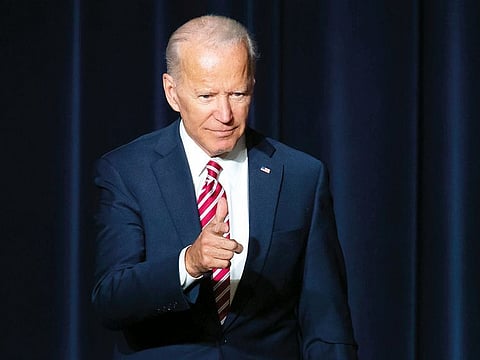What drove Joe Biden to run one more time
How Joe Biden decided to launch his third presidential campaign

Washington: Former US Vice-President Joe Biden announced Thursday that he would seek the Democratic nomination to challenge President Donald Trump in 2020, marshaling his experience and global stature in a bid to lead a party increasingly defined by a younger generation that might be sceptical of his age and ideological moderation.
Biden spent a hot August day at his lakefront Delaware home watching hatred on display in Charlottesville, Virginia, where, days earlier, torch-wielding white supremacists had marched through town. A counter-protester advocating racial equality was killed when a white supremacist drove his car into a crowd.
When Trump blamed the violence on “both sides,” the former vice president says he was stunned.
He turned to his closest advisers — his family — to discuss what to do next.
Spread out across the country, the Bidens quickly convened through a series of group text messages. For months, they’d weighed whether Biden, whose two prior White House campaigns were abject failures, should try again.
There was now consensus: Prepare to run against Trump.
Biden’s sister and longtime political confidante, Valerie Biden Owens, described Trump’s comments as a “blow” to the man who had served as the No. 2 to America’s first black president.
“It really started percolating, and the essence of this was Charlottesville,” Biden Owens said. “I can tell you that was a major motivating moment for my brother, and the entire family.”
“The big ‘yes’ started with this,” said Ted Kaufman, Biden’s longtime Senate chief of staff.
And it didn’t take that much arm twisting — before tragedy intervened.
Biden was ready to run in 2016 before his elder son, Beau, succumbed to brain cancer and left him navigating a grief so intense that the rigour of a presidential campaign was out of the question.
“It started out ‘yes’ and he had every intention of running, but ran up against the unthinkable and the only answer was ‘no,’” Biden Owens said.
Biden stayed in regular touch with former President Barack Obama after they left the White House, by phone and in person.
But Biden’s interest in another presidential campaign quickly became clear. By May 2017, he started a political action committee to support Democrats in the upcoming midterm elections. He solicited donors — something he’s never enjoyed — and began mapping out a plan to be a prominent player in the Democratic bid to regain the House and defend difficult seats in the Senate.
In August 2018, he boarded a flight from Washington to New York and a string of passengers encouraged him to run in 2020.
“I’m his sister. I know he doesn’t walk on water,” Biden Owens said. “The man has flaws like we all do. But this is a man who is decent.”
As he moved toward a campaign, Biden’s liabilities were clear. He has faced sharp criticism for his pointed questioning of Anita Hill, the African American woman who levelled sexual harassment claims at Supreme Court nominee Clarence Thomas in 1991. Biden has also been blasted for his role in crafting the 1994 crime bill, which is now blamed for disproportionately imprisoning hundreds of thousands of young black men.
He was less prepared for what happened on the afternoon of Friday, March 29. Lucy Flores, Nevada’s Democratic nominee for lieutenant governor in 2014, wrote an essay saying that, as vice president, Biden approached her from behind, put his hands on her shoulders, smelled her hair and kissed the back of her head.
Flores said the encounter wasn’t violent or sexual, but was “demeaning and disrespectful.” Biden was suddenly on the wrong side in the #MeToo era. He hadn’t launched a campaign, but was already facing calls not to run.
It took nearly a week before Biden posted a two-minute video of him recounting how expressions of affection had helped him but “social norms have begun to change.”
But when he spoke to a union audience in his first public appearance after the controversy, Biden said: “I just want you to know, I had permission to hug Lonnie,” to the cheers of the mostly male crowd.
His message was clear: Biden would run as himself, flaws and all.
— With inputs from AP
_resources1_16a4505551a_medium.jpg?w=320&auto=format%2Ccompress&fit=max)





